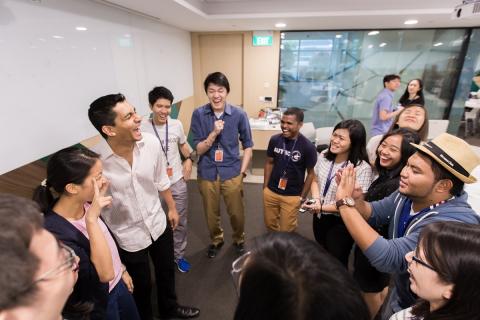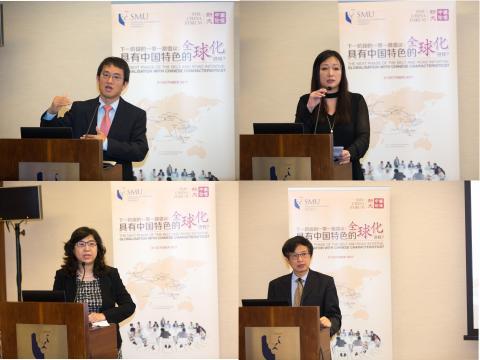
The Singapore Management University (SMU) welcomed business leaders, professionals, academics and students from local junior colleges and various universities to its annual Ho Bee Professorship Public Lecture series on 5 September 2017. This year’s lecture, themed on ‘China’s Paradox and its Role in the World Economy’, had received overwhelming response from an audience keen to be part of the session with Professor Jin Keyu, Ho Bee Professor in Chinese Economy and Business at SMU and a tenured professor of economics at the London School of Economics.
Established in 2007 by the Ho Bee Land Limited, the Ho Bee Professorship is awarded to a distinguished visiting faculty who is an acclaimed research scholar of high international standing, a thought leader with considerable expertise and contributions to the Chinese economy and business, as well as a passionate academic with a sterling track record in business education.
In his welcome remarks, SMU President Arnoud De Meyer said that SMU aims to contribute to the sound understanding and exchange of views on key developments surrounding China’s growth and development. Discussion forums such as the Ho Bee Professorship Public Lecture series are an example of a series of events organised throughout the year for that purpose. As a knowledge institution advancing education, cultural and community development in Singapore and the region, SMU values such opportunities to host eminent thought leaders with exceptional expertise in the area of the Chinese economy.

Professor Jin, a renowned researcher on Asian economics, achieved international recognition for her incisive and insightful commentaries on the new perspectives with which the world should view China. In 2012, she published an article titled ‘Europe Should Stop Arguing and Look to Asia’ in cooperation with Jin Liqun, who is currently President of the Asian Infrastructure Investment Bank (AIIB).
Delivering her public lecture to a packed auditorium of close to 250 guests, Professor Jin started by introducing the paradoxes existing within the current state of the Chinese economy, as viewed through her own perspective. These included China having the worst performing stock market in the past decade despite achieving stellar economic growth, the fact that it had delivered strong economic growth despite a large misallocation of capital and how its private sector was thriving despite the state’s prominent involvement in the economy.
Addressing a common perception of analysts and media that China’s streak of economic growth was running its last mile, Professor Jin discussed her conjecture that this held no truth. According to her rationale, China’s GDP per capita growth in the years after 1978 had taken place in waves; coinciding with major reforms in the country such as the Cultural Revolution, setting up of special economic zones, privatisation and China’s entry into the World Trade Organisation.
With its growth cycles being largely reform-driven, China may not necessarily grow in the manner of a conventional economy. History has shown that China’s remarkable economic growth from 1978 to 2005 was underpinned not by capital accumulation, but by productivity gains and a relocation of labour into the manufacturing and private sectors. It is within this context that Professor Jin rationalised that there remains numerous opportunities to stimulate China’s economic growth, such as by reallocating resources that unleash efficiency gains.

Professor Jin described a cycle where issues in China such as financial suppression, declining household share of spending, subsidising firms, high investments and exports, as well as distortionary policies were closely interlinked. She argued that these issues did not stem from disparate causes and suggested viewing them collectively within a single framework with which to understand China’s growth patterns.
In the area of political leadership, Professor Jin acknowledged that China had been playing a bigger role in the global arena in recent years. With its One Belt and One Road Initiative, China had demonstrated pragmatic economic leadership in providing a platform to enable multi-country infrastructure projects. Concluding that there is a tendency to fit China in a box when predicting its future, Professor Jin said that it might be more productive to view China with an unshackled mental framework.
Taking questions from the audience, Professor Jin underscored her view that China is still working on a strategy in regards to foreign policy. She reiterated her hopes that China would not be viewed by other countries as a threat, nor to be frozen out of the global framework. On China’s economy, she suggested that room for optimism remained, in view of urbanisation, developing services, the contribution of human capital as well as government levers to coordinate devices to suppress financial risks.